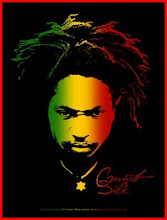Living The REGGAE LIFE

JIMMY Cliff is a living museum of the development of reggae music, but don't try telling him that. "As an artist, I have to be creative," he says. "It's what keeps me alive. I have never thought of myself as a living museum. Fortunately, the music keeps changing and I am able to change with it. If I had to stay in that one bag all the time I wouldn't know what I would do."His latest album, Black Magic, traces all the phases of reggae right up to today's style, which Cliff calls "dancehall reggae", and it uses many of the artists who have made reggae great. But Jimmy Cliff, 57, goes way back and beyond that, partly because he started out as a musician so early.
Raised in rural Jamaica, the son of a tailor who also farmed, he was simply bursting with the need to become a performer.
Actually, he thought he would be an actor. "I still think I am a better actor than a singer," he says. By TIM LLOYD





